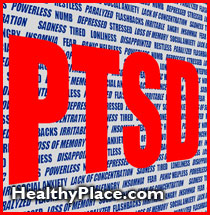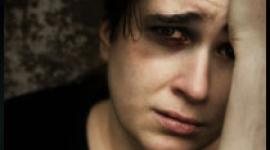Panic Attacks and Abuse Issues
Q:I have been having nightmares and flashbacks for a number of years which relate to abuse in my childhood. I also have panic attacks and anxiety as well. I often have the attacks when I'm driving and they can wake me up during the night. I have stopped driving altogether which is very frustrating for me and the family. These attacks frighten me because sometimes I feel as if I am "out of my body" looking down at myself and my eyes become so sensitive to light I have to wear sunglasses all the time. I also feel very giddy during the attack and it feels as if I have had an electric shock.
I often have the attacks when I'm driving and they can wake me up during the night. I have stopped driving altogether which is very frustrating for me and the family. These attacks frighten me because sometimes I feel as if I am "out of my body" looking down at myself and my eyes become so sensitive to light I have to wear sunglasses all the time. I also feel very giddy during the attack and it feels as if I have had an electric shock.
I was seeing a therapist who was helping me with the flashbacks and nightmares, but I stopped seeing her because my panic attacks and anxiety just got worse-and-worse. I have really worked hard in overcoming my problems and I have come a long way, but I can't get it together with my driving.
I also feel really angry all of the time and I don't know what to do about that. My therapist wants me to come back and keep working with her, but I am really scared the panic and the anxiety will get worse again. What can I do?
A: It sounds like you have had a very difficult time. From the description of your letter it sounds as if you have Post-Traumatic Stress Disorder (PTSD), which is an Anxiety Disorder and it is not uncommon for people with PTSD to also have Panic Disorder and Depression. Some of the symptoms you mention, including depersonalization, sensitivity to light are classified as Dissociative symptoms, again very common in people with PTSD and/or Panic Disorder. Also, your symptom of giddiness can be related to Dissociation or it could be a result of not eating and/or hyperventilation.
In regards to your driving, what we have found over the years is there is one type of Panic Attack people have which is related to Dissociation. Another word for Dissociation is Self-Hypnotic trance. When people dissociate they get a variety of symptoms, including 'out of body' experiences, not feeling real, seeing their environment through a white or a gray mist, stationary objects may appear to move, tunnel vision, sometimes they may feel an electric shock, or burning heat move through the body, or a 'whoosh' of intense energy.
It is quite easy to induce these states in people who are vulnerable to them. Research shows we can enter a Dissociate state within a 'split second.' One of the easiest ways to induce this state is by staring. When people are driving, they stare at the road ahead or sit and stare at a red traffic light and without warning they get a number of the above symptoms. Many people report the symptoms can happen while working on a computer and a large number of people report fluorescent lights also help to induce this state. It can also happen when we relax, watch TV, or when we read a book. One study which links dizziness to depersonalization suggests it is not what we are doing at the time we dissociate, it 'is the magnitude of the change in consciousness which is significant.'
The prevailing thought is that when we relax, we have more time to think about our Disorder and this is why our symptoms increase. Many of us who dissociate, and have recovered using Cognitive Behavioral Therapy, disagree with this theory. We can enter a dissociative state very easily no matter what we are doing and no matter what we are thinking. Recovery for many of us means understanding how we induce these states and how we deal with these states by using Cognitive skills to work with our fear and anxiety-producing thoughts.
The research on the 'night' attacks shows the attack happens on the change of consciousness as we move from dreaming sleep to deep sleep, or from deep sleep back to dreaming sleep. The research also shows the attack is not related to dreams or nightmares. Many of us can experience the night attack as we go to sleep at night or as we wake up in the morning.
If you are not eating properly and/or not getting enough sleep, you become more vulnerable to Dissociation. The symptoms are not harmful in themselves and once people can see how they are doing it, they lose their fear of them and some people report they now actually enjoy it when it happens!
One of the points we picked up in your letter is your comments regarding your childhood. Many people with childhood trauma do dissociate. In fact, many people learned to dissociate as a way of defending themselves against ongoing abuse.
Your therapist is correct in wanting you to return to therapy to deal with the issue of abuse. There is no denying that therapy can be traumatizing, as you do need to work with many of the painful memories. But it is the one way that will help you resolve the many issues you are currently facing in regards to the abuse. And therapy can also be a major factor in the inner healing process. Your anger is a natural result of what has happened to you. From what you have said in your letter, you have every reason to be angry and your therapist will help you work with the anger in a more appropriate way, rather than keeping it locked inside you.
Many of our clients, who also have an abuse background, learn to understand and manage their Dissociation, anxiety and panic, which in turn takes some of the pressure away from them as they continue in therapy. You are obviously making great progress in your own personal management of your symptoms. Remember when it first began, it was difficult to believe that the intense symptoms were anxiety, panic and depression. This is very normal for all of us. But as you have said, once we begin to accept what the symptoms are, it does make things easier.
If you do decide to return to therapy, you will be in the position of having much more knowledge of the symptoms than you did when they first manifested. This is to your advantage and will give you much more power over them than you had previously.
References
Uhde TW, 1994, Principles and Practice of Sleep Medicine, 2nd edn, ch 84, WB Saunders & Co.
Frewtrell WD et al, 1988, 'Dizziness and Depersonalization', Adv. Behav. Res, Ther., vol 10, pp 201-18
next: Dissociation and Anxiety
~ all articles on insights into anxiety
~ anxiety-panic library articles
~ all anxiety disorders articles
APA Reference
Tracy, N.
(2008, October 3). Panic Attacks and Abuse Issues, HealthyPlace. Retrieved
on 2026, February 23 from https://www.healthyplace.com/anxiety-panic/articles/panic-attacks-and-abuse-issues


